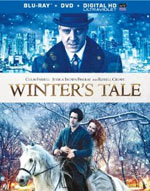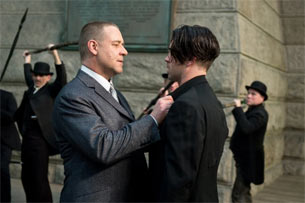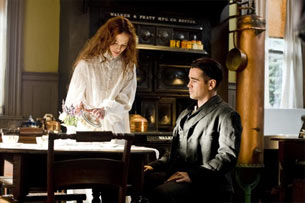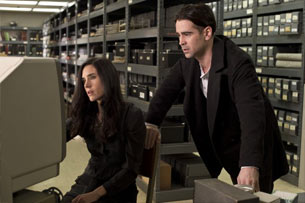

 - for violence and some sensuality.
- for violence and some sensuality.
Set in a mythic New York City and spanning more than a century, "Winter's Tale" is a story of miracles, crossed destinies and the age-old battle between good and evil.
Peter Lake (Farrell) is a master thief who never expected to have his own heart stolen by the beautiful Beverly Penn (Brown Findlay). But their love is star-crossed: she burns with a deadly form of consumption, and Peter has been marked for a much more violent death by his one-time mentor, the demonic Pearly Soames (Crowe). Peter desperately tries to save his one true love, across time, against the forces of darkness, even as Pearly does everything in his power to take him down. What Peter needs is a miracle, but only time will tell if he can find one.
(from Warner Bros.)

Some films exceed the boundaries of a specific genre. With a film titled Winter's Tale, you might expect a Disney film like Frozen or something fantastical along the lines of Stardust. But instead, Winter's Tale is somewhere in between, mixed with dashes of films from across the spectrum, making the end result perhaps a bit too all over the place for its own good. Longtime producer but first-time big screen director Akiva Goldsman takes the reins on Winter's Tale, adapting the novel as an ambitious romantic fantasy about angels, demons and miracles that establishes its own set of rules and universe with an execution that doesn't quite work as well as it could.
Some movies that aim to establish an alternate universe to our own can end up being more confusing or distracting, leaving more questions than answers while we're watching. It's one thing to show us a galaxy far, far away, but another to establish a place like 1916 New York City as the backdrop for a story involving miracles and supernatural warfare. We're soon introduced to Peter Lake in preset-day New York, as he visits Grand Central Station in search for answers to who he is. We simultaneously see flashbacks to what appears to be his parents, back in the early 1900's, trying to earn passage into the United States. However, his father is turned away for having "consumption," forcing him to take his wife and baby with him. They decide to steal a model ship and stow Peter away in it (much like Moses), sending him back to New York to have a chance at life. We then see Peter grown up, years later, attempting to escape the clutches of a villainous man named Pearly Soames, played by Russell Crowe, who immediately appears to have some kind of otherworldly traits. Peter is rescued by a white horse with special abilities and tries to escape the city. On his way out, he decides to rob one last house (as we then learn he's a professional thief...yet, he is also a mechanic?), and there he meets the 21-year-old, ailing Beverly and instantly falls for her. At this point, the viewer is still wondering what in the world is going on; Peter's a thief who meets a sickly beautiful girl after being guided by a mysterious white horse as he tries to escape an evil, potentially supernatural gang leader... And he's a professional thief, but also a mechanic. Are we getting all this right?

As things progress, we discover that Pearly is actually some kind of demon who occasionally meets with Lucifer himself, played by Will Smith, who apparently lives underground in a tunnel in the pitch dark (but he turns a light on to talk to Pearly). Their goals seem to be to stop humans from performing the one miracle they're created for and that appears to be the main plot of the film: for Peter to perform his God-given miracle. Things eventually jump 100 years to present day when Peter meets Virginia Gamely, played by Jennifer Connelly, who helps Peter remember his past. For as great as a cast that Winter's Tale boasts, you'd be surprised how sparingly everyone seems to be used (aside from Farrell and maybe Crowe). Don't get too excited that Connelly is in the film -- or Smith or White Collar's Matt Bomer. Bomer has mere minutes in the film in the opening flashback, while Connelly only has a handful of scenes later in the film and Smith has about 3 short appearances. Other notables also come and go rather quickly. It's ultimately Farrell's show, and while he does a great job with what he's been given to work with, the film just feels a bit too disjointed and uneven. It's almost as if we, the audience, aren't ever really privy to the full story driving Winter's Tale.
To the film's defense, I feel like it's a movie and story that would play out better with a second viewing. By the time the credits roll, you kind of have an idea of what Goldsman was aiming for, even if he didn't quite convey it as clearly as he probably hoped to. But with a second viewing, you'll probably have more of a handle on the rules of Goldsman's world and who the players are in the film. Jessica Brown Findlay is charming as Beverly and her scenes with Farrell are decent, but we never really get that tangible chemistry that two romantic leads need to make a film like this work so well. Crowe seems to have a blast being the evil Pearly, but his performance borders on being too campy for this kind of movie. It almost feels like Goldman had a couple different ideas for different movies and tried to fit them all into one. By the time Farrell is teamed up with Connelly, it starts to feel like yet another film.

The content isn't quite as rough as one might expect with a PG-13 movie, however it definitely earns its rating. There's some violence that may be surprising to some viewers, but while violence is often quite gratuitous in action films and in certain TV shows, Goldsman does a good job of not focusing too much on it. For instance, when we first see Peter escaping from Pearly and his men, it looks like Peter stabs one of the men and then maybe even cuts the throat of another. It's done silently and so fast and subtly, that it seems like attention isn't meant to be drawn to it. Most dramatic or action films tend to add sound effects or show it graphically, and Goldsman kept it ambiguous. Later, Pearly appears to stab or choke a man just off screen and then draw a picture with the victim's blood (that spilled on the table) with his fingers (which clearly looks like a watercolor drawing when we see it again in later scenes), but the killing isn't focused on. What's really strange, however, is when Pearly gets angry a couple times, his face cracks or splits in a disturbing way to symbolize some kind of supernatural, demonic presence. In one scene, when Will Smith's Lucifer gets angry, his mouth opens abnormally large and his teeth are briefly seen as longer fangs. Winter's Tale seems to focus a lot on good versus evil with heaps of symbolism (as evidenced when Peter on a white horse confronts Pearly on a black horse, or in the film's use of light), as well as miracles. The most graphic scene of the film is when two people fist fight, and one of them jabs a piece of metal into the neck of the other. We see a little bit of blood around the hand of the victim holding their own throat and then briefly some blood on the piece of metal. Sexual content is brief but definitely present. Beverly complains about never having been kissed, and in one scene we see her disrobe and descend into water, with no nudity shown. Later, Peter watches her on a rooftop where we see her nude silhouette through a curtain. She then emerges in a robe, which she lowers so Peter can see, and we briefly see her partial, rear nudity from a pretty far away distance (it's barely noticeable). He then comes to her and she asks him to make love to her, and he agrees to, so we briefly see them in bed kissing passionately with him on top (with them under the covers in the act). It's a short scene, but sensual enough to warrant caution. Finally, there's a little bit of language, with most of it actually being blasphemy, surprisingly, but it's rather infrequent (despite being very unnecessary).
Overall, Winter's Tale seems to have everything in place for a nice romantic period film, but Goldman appears to have trouble assembling it in the most effective way. Fans of any of the main cast will probably enjoy it most, but those looking for a solid romance or romantic drama probably won't find Winter's Tale satisfying enough.
- John DiBiase (reviewed: 6/22/14)
Behind the Scenes: Winter's Tale: A Timeless Love (6:08) - This little behind-the-scenes featurette focuses on Goldsman adapting the original novel into the film and what the theme of love means for the story. We then hear all of the main cast and crew talk about the film's themes and their intepretations of it.
Behind the Scenes: Characters of Good and Evil (9:14) - Director Akiva Goldsman and crew discuss the characters of the film, starting with light and how it's used for good or evil. They cover the evil of Pearly versus the good of Peter, while the actors talk about working with each other and with Akiva as a director. Akiva reveals that he made the film in the hopes that everything in life happens for a reason.
Additional Scenes (12:08) - To round out the extras we have a montage of "additional scenes," starting with an extended version of Peter's parents sailing him off to New York. While I realize it would have prolonged the beginning, Peter's mom says to someone who opposes their decision to put Peter in a boat, "who are you to say a miracle is impossible?" which pretty much sets the theme for the film. This batch of scenes ends with Peter being found as an infant on shore. Next is an extended scene where Peter fixes a pump and is asked how long he's been doing it. "Athansor Breaks Free" is the first official deleted scene which shows the white horse breaking out of his barn and running through the city. The next is a deleted shot of Pearly punching one of his guys repeatedly, telling him he'd kill him if he could. Following is an extended scene called "Peter Visits Humpstone John" where Peter visits him and refers to him as "dad" and asks him for "fatherly advice." (I guess he was his "father" who found him?) "Thems Are Thieves" is an extended scene where a man is telling Pearly about the different groups of people in a warehouse. "Peter and Isaac Penn Discuss New Years" is a deleted scene where Peter talks to Beverly's dad, asking him to allow him to take her out for New Year's. "Yes, Baby" is a short deleted scene where Virginia answers a series of questions from her daughter Abby with just "Yes, baby" each time. The following scene is an extended conversation between Virginia and a doctor about her daughter's condition. It then concludes with a talk between Virginia and Abby about stopping her treatments. The next one shows Pearly's men conspiring outside of Virginia's place (1 "g*dd*mn"), while "Abby is Saved" is a pair of deleted moments at the end -- one is a callback to earlier in the movie and the other is Abby throwing snowballs at Virginia from the snow off of Pearly's frozen body. The final deleted scene is a voiceover from Willa talking about how sometimes we save and sometimes we are saved.
- John DiBiase, (reviewed: 6/22/14)
Disclaimer: All reviews are based solely on the opinions of the reviewer. Most reviews are rated on how the reviewer enjoyed the film overall, not exclusively on content. However, if the content really affects the reviewer's opinion and experience of the film, it will definitely affect the reviewer's overall rating.
 Casey J Drops First Album in 6 Years, "The Stories We Sing Vol. 1" Casey J Drops First Album in 6 Years, "The Stories We Sing Vol. 1"Thu, 05 Mar 2026 13:46:00 EST |
 The K-LOVE Fan Awards Returns to Nashville's Opry House May 24 The K-LOVE Fan Awards Returns to Nashville's Opry House May 24Thu, 05 Mar 2026 13:35:00 EST |
 StowTown Records Releases New Album "Rise and Shine" from Sunday Drive StowTown Records Releases New Album "Rise and Shine" from Sunday DriveThu, 05 Mar 2026 13:12:00 EST |
 Mat Kearney Announces "Nothing Left To Lose" 20th Anniversary Tour Mat Kearney Announces "Nothing Left To Lose" 20th Anniversary TourWed, 04 Mar 2026 19:10:00 EST |
 We The Kingdom Celebrates RIAA Gold Certification of "God So Loved" We The Kingdom Celebrates RIAA Gold Certification of "God So Loved"Tue, 03 Mar 2026 18:40:00 EST |
 Mary-Clair Attends Lionsgate's "I Can Only Imagine 2" Premiere Mary-Clair Attends Lionsgate's "I Can Only Imagine 2" PremiereTue, 03 Mar 2026 18:30:00 EST |
 Stand41TrueGod to Release New Single "Wilderness" on All Platforms March 13 Stand41TrueGod to Release New Single "Wilderness" on All Platforms March 13Tue, 03 Mar 2026 18:20:00 EST |
 Click here All News Headlines |
Click here All News Headlines |